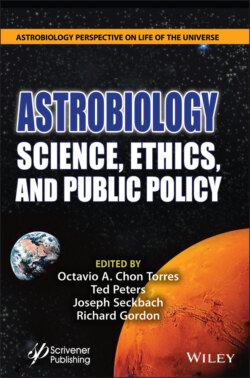Читать книгу Astrobiology - Группа авторов - Страница 32
2.3.1 Does Planetary Protection Apply Equally to Both Earth and Off-Earth Locations?
ОглавлениеOur mandate for Planetary Protection (PP) is made clear in Article IX of the 1967 UN Outer Space Treaty. “Parties to the Treaty shall pursue studies of outer space including the Moon and other celestial bodies, and conduct exploration of them so as to avoid their harmful contamination and also adverse changes in the environment of the Earth resulting from the introduction of extraterrestrial matter and, where necessary, shall adopt appropriate measures for this purpose…” [2.85]. This version of the PP principle seems to make it clear: we are morally obligated to protect both Earth and other celestial bodies.
The risk of contamination goes in two directions, forward and backward. The possibility of “forward contamination” alerts us to the risk of disturbing an already existing ecosphere; the introduction of Earth’s microbes carried by our spacecraft or equipment could be deleterious to an existing habitable environment. During the SARS-CoV-2 pandemic, NASA issued two interim directives (NIDs) to protect both the Moon and Mars from forward contamination brought by earthlings [2.53]. “Back contamination” would occur if a returning spacecraft brings rocks or soil samples that contain life forms not easily integrated into our terrestrial habitat. When Apollo 11 returned to Earth in 1969 from its Moon landing, it brought Moon Rocks which President Richard Nixon divided into rice grain sized pieces and distributed to each of the 50 states and 135 nations as souvenirs. To this date, no earthling has suffered from back contamination.
Are we earthlings equally concerned about both our own planet and each off-Earth site? Not in practice. In practice, prevention of backward contamination trumps protection against forward contamination. Although forward contamination is a matter of concern, some forward contamination is permissible, opine NASA scientists Catharine Conley and John Rummel. What is not at all permissible is backward contamination. Preventing harmful contamination of the Earth must be of the “highest priority” for all missions [2.73].
Even so, PP in principle includes moral concern for protecting off-Earth bodies from Earth’s contamination. “Planetary protection covers explicitly the search for extraterrestrial life and also the potential for Earth life to interfere with future human objectives” [2.17] [2.18]. As we proceed to refine astroethics, we should ask: Might one or another off-Earth biosphere hold intrinsic value? And, if so, might this heighten our responsibility for protecting it from contaminants from our home planet?
